- Home
- J. T. Edson
Dusty Fog's Civil War 9 Page 4
Dusty Fog's Civil War 9 Read online
Page 4
“We’ll be making a long halt at the foot of the slope, ma’am,” Dusty told the girl. “I reckon your horse’ll make it that far. When we move on, you can use one of our reserve horses—if you can handle it.”
“If it has hair and the usual number of legs on each corner, I can handle it,” Belle answered.
Although Belle’s arrival and appearance caused something of a stir among the soldiers, discipline remained and they kept their comments down to low mutters while moving off. Belle had long since stopped feeling embarrassed at the attention her revealing riding clothes attracted among members of both sexes.
At the foot of the slope Billy Jack and Kiowa stood by their horses and guarded two dejected prisoners, one tending to the other’s shoulder. A still, blue-uniformed shape sprawled on the ground beyond them.
“Had to kill that one, Cap’n Dusty,” Billy Jack reported.
“It happens,” Dusty replied. “Take a point, Kiowa. We’ll make our long halt by that stream down there.”
“Yo!” Kiowa answered, going to his horse.
During her dash for freedom Belle had barely noticed the small stream. Surrounded by a force of skilled fighting men, she could allow her tired horse to drink in safety. She noticed that the two prisoners were in no way mistreated, but that an escort surrounded them and prevented any chance of escape.
Much as Belle wanted to lay her suggestions before Dusty, she set about attending to her horse first. To fail in such an elementary precaution was foreign to her nature, and she knew failure would lower her standing in Dusty’s eyes. While stripping off the bay’s saddle, she felt Dusty’s eyes on her. Belle Boyd had a reputation for being real good with horses and she had to prove it to an acknowledged master in that line.
After the bay had drunk its fill and indulged in a good roll, Belle accepted the loan of a feed bag from one of the Texans, collected some grain from the supply carried on a pack horse and fed her mount. All around her men carried out the same tasks, working with the minimum of supervision. Not until every horse had been cared for did the men prepare their own meal. Nor did the Texans relax and grow careless. On each side, far from the column but in sight of it, keen-eyed pickets kept watch for any sign of the enemy.
Opening one of her bags, Belle took out a pair of black silk stockings. She slipped a hand into the top of one and drew a slip of paper from where it had been concealed in a pocket carefully and cunningly built into the upper section. Handing the paper to Dusty, she watched him open and read it.
“It is genuine,” she remarked.
“I know old Stonewall’s signature. Nobody else could write that bad,” Dusty replied, looking again at the message identifying Belle Boyd and requesting all C.S.A. personnel to render her every assistance. “You’d get this from Colonel Cope in Atlanta, I reckon.”
“There’s no Colonel Cope in our Secret Service,” Belle answered, pleased that the other did not take the document entirely for granted. “I don’t often have orders but when I do, I get them from General Mandeville.”
“Pleased to meet you, Miss Boyd,” Dusty smiled. “May I present my second-in-command, Mr. Blaze. Red, meet Miss Belle Boyd.”
“Right pleased to know you, ma’am,” Red greeted.
“My pleasure, sir,” she replied. “Now may I ask what you’re doing here, Captain Fog?”
“General Hardin sent me up this way to create a diversion. Stir up the Yankees and draw some of their men out this way. He’s sending Company A in to destroy a Union supply depot near Little Rock. I figured on wrecking a bridge up there on the Coon Fork of the Arkansas.”
“That’s where I came from and picked up my escort,” Belle warned. “There’s a company and a Vandenburg volley gun guarding it.”
“We figured on at least that much,” Red put in. “Dusty’s taken better guarded things than that.”
“Would you be interested in hitting at an even more important target?” Belle inquired, smiling a little at Red’s open admiration for his smaller cousin.
“If it’s worthwhile,” Dusty agreed.
“Would you say raiding a U.S. Army paymaster with fifty thousand dollars in gold is worthwhile?” asked the girl.
Dusty and Red exchanged glances and Belle could see she had their interest.
“I can think of less important things,” Dusty finally said. “Let’s hear about it, Miss Boyd.”
“It began after I returned from Europe a few days back,” Belle explained. “I went to Washington and picked up some information from one of our agents. The U.S. Government is sending fifty thousand dollars in gold to the Indian Nations. It’s partly payment for troops there and the rest to be divided among the chiefs of the Osage, Pawnee, Cow and Arikara tribes as an inducement for them to keep the peace and resist the suggestions of the Cherokee Nation to take sides in the War. So I came straight out here and finished at the Dragoons’ camp near Russelville. I learned all I could, then headed for our territory. It would have been tight if I’d had to cross the Ouachita and find a Confederate outfit, but meeting you here gives us plenty of time. I know the route they’ll take with the shipment and the other details.”
“How big an escort will it have?” asked Dusty.
“The Yankees don’t want to attract too much attention to the shipment for obvious reasons. So ostensibly it will be merely guarding the carriage of a general on a tour of inspection. The escort will consist, in this area, of a large company of Dragoons, between fifty and sixty men.”
“A fair number,” Dusty remarked, thinking that his force numbered only forty and that at least six of them would be needed to guard the reserve and pack horses.
“Only Dragoons though,” grinned Red, his eyes glinting with the light of battle. “Comes to a fight, we’ve damned nigh got that many outnumbered.”
“That depends,” Dusty drawled, eyeing his impetuous cousin tolerantly.
“On what?” asked Belle.
“Whether we take them on under our terms and on our ground, or theirs,” Dusty answered. “Tell me about your activities. Everything you’ve done since you came out here.”
Speaking concisely and leaving out only the names of her helpers, a precaution Dusty admired, Belle gave the Texans a clear picture of everything she had done including her escape and how she covered her tracks.
“I’m sure nobody missed me in the excitement. And I reckon the sentry will insist he doesn’t know who hit him,” she concluded—which proved to be correct, for at that moment Private Hooley stood before his colonel and stoutly affirmed how he had been struck from behind by a person or persons unknown—“And if I know soldiers, they’ll none of them be willing to admit they don’t know how few men jumped them. In fact, I’d take money that they swear to seeing a Confederate company, probably your own, Captain Fog, jump them.”
Dusty accepted the tribute to his face without any comment, being more concerned with the practical side of the matter. “Then the Dragoons may be out looking for us, he pointed out.
“It’s possible,” admitted Belle. “However, I’d guess that Colonel Verncombe won’t bother. He’ll believe that, having over fifty of his horses, you’ll have made a fast run for the Ouachita, and will get right to clearing up the damage rather than waste time.”
“Only thing to do is find out where the Yankee general will be travelling then,” Dusty commented and walked to where his saddle lay on its side. Opening one of the pouches, he took out a folded map and returned to the others. Spreading the map Dusty looked at the girl. “Any suggestions, ma’am?”
“You might try calling me ‘Belle,’ ‘ma’am’ makes me feel old,” she smiled. “They’ll be going over the Crossland Trace.”
Examining the map, Dusty ran his finger along a line marking the Crossland Trace, a wagon route running to the north of Russelville and communicating with the Indian Nations’ forts. The map, looted from a Union Army camp, was good and carried enough detail for Dusty to be able to visualize the land through which the shipment trave
lled. For almost five minutes he sat studying the map, while Red and Belle left him to his thoughts. At last he looked at the other two.
“How long before the shipment comes through?” he asked.
“I’ll send a man to relieve Kiowa,” Red remarked, and rose to give the order.
“Red appears to know you,” Belle said and then answered Dusty’s question. “Captain Christie met it this morning and will be started out now. I’d say that we might pick it up the day after tomorrow. An escort and carriage won’t be travelling at any speed.”
“Reckon it won’t,” agreed Dusty. “All non-coms, Mr. Blaze.”
Knowing his cousin, as Belle said, Red had already given the order which brought the company’s sergeants and corporals gathering about their leader. Dusty told them their mission and eager rumbles went up among the half-circle of tanned, tough-looking men. Then he proceeded to explain his plan in detail, after scraping clear a piece of earth on which to draw a large-scale map.
Belle watched everything and her original relief at being rescued by Dusty grew to delight at her good fortune. Already she had made an estimation of Dusty’s capabilities and knew her judgment was correct. Not only was the small Texan a top-grade fighting man, but he also possessed a shrewd, calculating brain—and used it. If attention to detail guaranteed success, then their mission must be a success. However, Dusty’s plan surprised her in one respect and, when he finished talking, she brought up the point.
“I thought you might make your move further west.”
“And I would,” agreed Dusty, “if I could find a place so well suited to my idea. You’ll stay with the reserve mounts’ detail when we make our attack, Belle.”
“With your permission, I’d rather go with your party,” she objected.
“You, ma’am,” grinned a burly corporal. “It’ll be no place for a woman.”
Sighing resignedly, Belle came to her feet in a swift, graceful move and faced the man, but looked towards Dusty. “I have this trouble every time,” she remarked. “Well, it may as well be now as later.”
“You’ve left me behind, Belle,” Dusty answered.
“Every time I offer to take a hand in a fight, some big, strong man decides that it’s no place for a woman and I have to prove my point,” she explained, taking out her Dance and removing the percussion caps from its chamber. “Unload your gun, Corporal.”
After glancing to Dusty for permission, and receiving it, the grinning corporal followed Belle’s lead in rendering his right side Colt safe. Holstering his gun, he faced the girl from a distance of about four feet. Belle’s right hand lifted to hover over the butt of her Dance.
Watching the girl, Dusty smiled a little, although his gaze directed at her feet instead of her hand. Instead of the normal stance for drawing and shooting, Belle’s feet formed a T position about her shoulders’ width apart, the left pointed at the corporal, the right’s heel aimed at the center of the left, and both knees slightly bent.
Down stabbed the corporal’s hand in a smooth, fast move, fingers closing on and lifting the Colt. Even as his gun came clear, the corporal realized that Belle had not even attempted to draw her Dance. Instead she drew back her right leg, maintaining her balance with grace and agility. Straightening out her left leg, she raised herself on to her toes so as to gain added power to the right as it swung forward and up. Her toes caught the corporal’s hand just as the Colt came out. Giving a yelp of surprise and pain, he lost his hold on the gun. His troubles did not end there.
In a continuation of the kick, Belle came down to both feet, rotated her body in a swift pivot and delivered a rear stamping kick to the man’s stomach. Although she used less than her full strength, Belle doubled the startled soldier over. Again Belle pivoted, her right hand raising, clenched into a fist, and driving down so its heel struck the back of the man’s neck and sent him to his knees. Stepping back, Belle drew and cocked her Dance.
“Well?” she asked.
Roars of laughter greeted her actions and the corporal looked up with a rueful grin. “Reckon this’s no place for a man,” he said. “You wouldn’t’ve fooled Cap’n Dusty that way, I bet, ma’am.”
“Not being fooled is why he’s the captain and you’re only a corporal,” Billy Jack pointed out.
“How about it, Dusty?” asked Belle.
“You’ve made your point,” Dusty answered with a grin. “You ride with my party. Now if you’ve finished fooling about, we’ll go through the plan again.”
Four – Captain Fog’s Plan
Even though he approached the section of the Crossland Trace known as the Funnel, Captain Christie of the 6th New Jersey Dragoons felt neither concern nor apprehension for the safety of the visiting general entrusted to his care.
Some freak of nature had left a curious land formation at that point of the Trace. The gash carved into the land by innumerable wagon wheels and horses’ hooves passed along the bottom of a valley towards a high, sheer cliff to wind through a narrow gorge which alone gave access to the land beyond the cliff. The valley itself had wooded slopes, but a good hundred yards of clear, open land separated the woods from the trail and, in Christie’s considered opinion, rendered unlikely the chances of a successful ambush.
Riding slightly to the rear of the general’s wagon, in a position which kept himself under the view of the senior officer while giving the appearance of being entirely occupied with the work of ensuring his charge’s safety, Christie looked back at his command. A large company, sixty in strength, armed with Springfield carbines and Army Colts, strung out behind the general’s carriage made an impressive and comforting sight. Only a good-sized confederate force would risk attacking so many men, Christie decided, and he doubted if a rebel outfit of any size could come so far north into Union-held territory. So he kept all his command riding in four smart, military-looking columns which ought to please the general, and ignored the suggestion his sergeant-major made about sending scouts ahead or putting flanking details out to search the wooded slopes.
Christie was one of a new breed of officer the War brought into the Union Army. Before the outbreak of hostilities, the South provided the majority of officers for the army, but most of them left to join their seceding states when the War began. Faced with a shortage of officers, the Union had to accept many men who would never have made the grade in the strict days before the War. Christie was one of them. Not that he originally intended to become a soldier. An interest in politics and a hatred for anyone who did not blindly conform to his beliefs made a patriot out of him. Having a prominent member of the Radical Republican Party for a father, Christie received acceptance and faster promotion than his talents merited. However, one needed to come into the eye of senior authority to rise higher than a captain, even in wartime. Coming into the eye could be done in two ways, by courage and endeavor on the battlefield, or by showing to good advantage in some general’s presence. Not wishing to risk his valuable neck in action, Christie chose the latter. By waving his father’s influence, he gained command of the escort for General Main, and to prevent anyone sharing the limelight, he left his second-in-command at the regiment’s headquarters.
Daydreaming of a rosy future when, on Main’s recommendation, he reached field rank, Christie rode towards the opening of the gorge. Suddenly his pleasant thoughts were shattered by a series of wild, ringing yells and a scattering of shots from the rear. Turning in his saddle, he saw something which sent a shock of apprehension through him. Having a firm belief that he was destined to do great things in the improvement of his country, Christie avoided taking risks and had never been in action. For a moment his numbed mind failed to function as he watched the gray-clad riders burst from the left side of the trail some distance behind the end of his column.
Fortunately for Christie, his sergeant-major was an old soldier. Christie always regarded the non-com as a semi illiterate fool who came into the army because he could not hold down any other work, but at that moment the captain could have
fallen on the other’s neck in joy.
“Driver, move that carriage on the gallop!” the sergeant-major roared. “First three files follow it. Remainder form line. Dismount. Prepare to fight on foot.”
Although Christie had laid down instructions for action in case of an attack, he could not collect his thoughts in time to give them. Even the sergeant-major might have failed had the rebels come in with a silent rush instead of yelling and firing shots prematurely.
Typical of his type of mentality, Christie had been a martinet who drove the men under him rather than leading them. In this instance the driving bore fruit. Long hours of drill had taught the men in the escort to react almost instinctively on hearing commands. The carriage’s driver swung his whip and urged his four-horse team forward at an increasing pace into the mouth of the gorge, followed by a sergeant and the first three files of four men from the column. The remainder of the escort worked fast, swinging their horses into line across the mouth of the gorge. On dismounting, one man in six grabbed hold of the reins of the other five’s horses to leave the five free to fight. That had become standard U.S. Army tactics, although Christie trained his men in what he regarded as an improvement on normal procedure.
Most cavalry outfits had one man in four holding the horses. Christie decided that one in six would give him more men to fight and trained his company accordingly, putting the sergeant-major’s tentative objections down to the stagnated thinking of a limited military mentality. Certainly the system showed its merit as the horse-holders grabbed their companions’ reins and backed off to leave five, not three, men facing the enemy.
Standing in the center of his men, Christie gave a superior smile as he watched the rebel cavalry mill uncertainly just beyond pistol range. To Christie that only went to prove his theories. It was so like the decadent Southerners to botch a good chance, then show cowardice in the face of a determined enemy. So thought Christie, nerve coming back as he saw the danger diminish. All he needed to do was keep his men in position and hold the rebels back until the carriage gained a good lead, then mount up and follow.

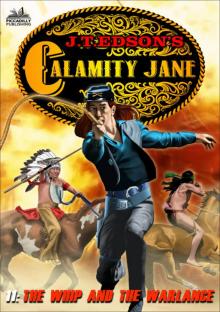 Calamity Jane 11
Calamity Jane 11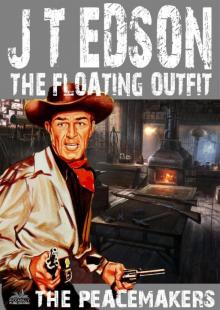 The Floating Outift 33
The Floating Outift 33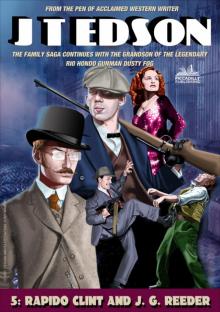 Cap Fog 5
Cap Fog 5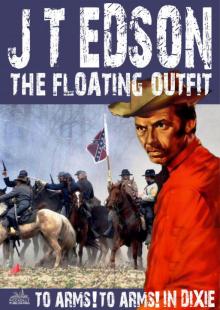 The Floating Outfit 34
The Floating Outfit 34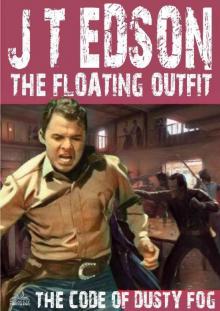 The Code of Dusty Fog
The Code of Dusty Fog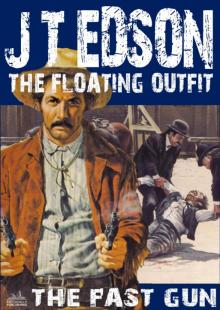 The Floating Outfit 21
The Floating Outfit 21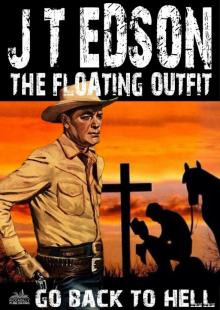 The Floating Outift 36
The Floating Outift 36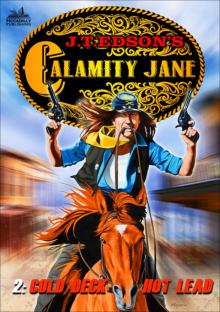 Calamity Jane 2
Calamity Jane 2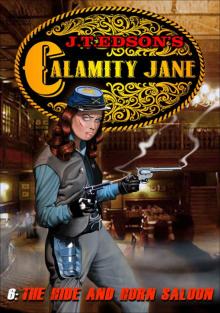 Calamity Jane 6: The Hide and Horn Saloon (A Calamity Jane Western)
Calamity Jane 6: The Hide and Horn Saloon (A Calamity Jane Western)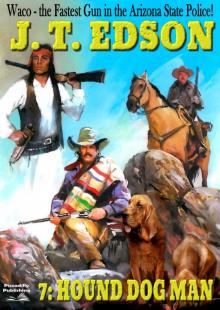 Waco 7
Waco 7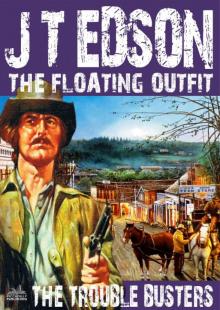 The Floating Outfit 25
The Floating Outfit 25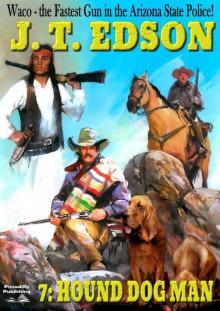 Waco 7: Hound Dog Man (A Waco Western)
Waco 7: Hound Dog Man (A Waco Western)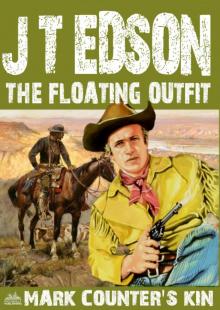 The Floating Outfit 47
The Floating Outfit 47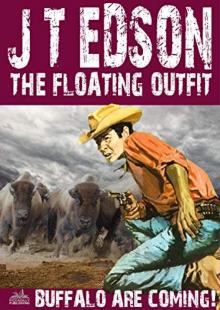 The Floating Outfit 42: Buffalo Are Coming!
The Floating Outfit 42: Buffalo Are Coming!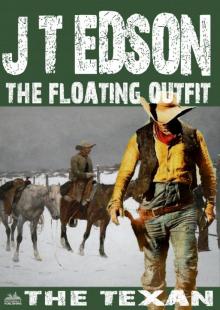 The Floating Outfit 46
The Floating Outfit 46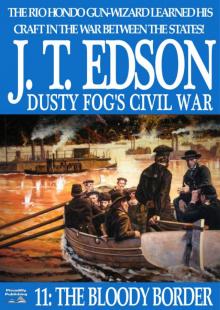 Dusty Fog's Civil War 11
Dusty Fog's Civil War 11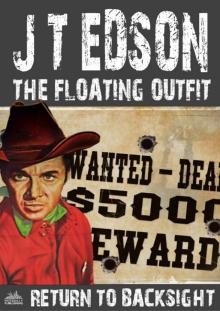 The Floating Outfit 61
The Floating Outfit 61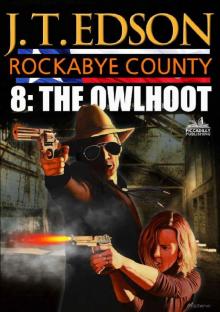 The Owlhoot
The Owlhoot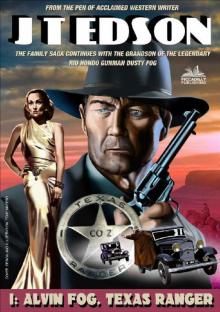 Alvin Fog, Texas Ranger
Alvin Fog, Texas Ranger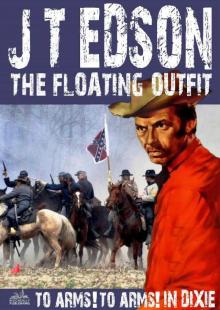 The Floating Outfit 34: To Arms! To Arms! In Dixie! (A Floating Outfit Western)
The Floating Outfit 34: To Arms! To Arms! In Dixie! (A Floating Outfit Western)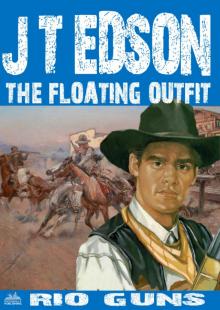 The Floating Outfit 44
The Floating Outfit 44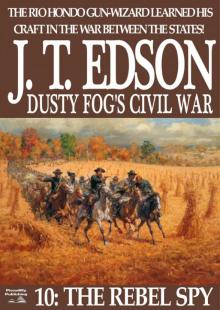 Dusty Fog's Civil War 10
Dusty Fog's Civil War 10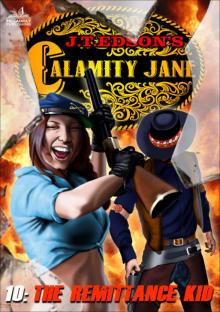 Calamity Jane 10
Calamity Jane 10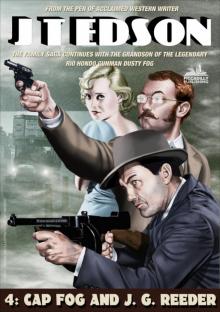 Cap Fog 4
Cap Fog 4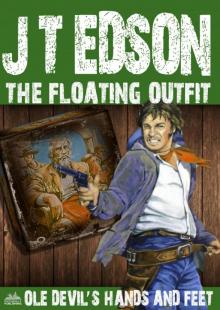 The Floating Outfit 51
The Floating Outfit 51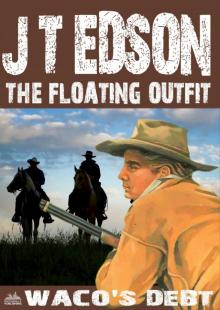 The Floating Outfit 50
The Floating Outfit 50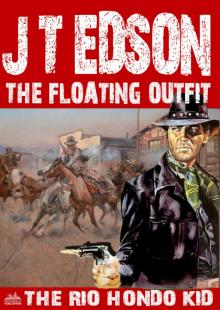 The Floating Outfit 49
The Floating Outfit 49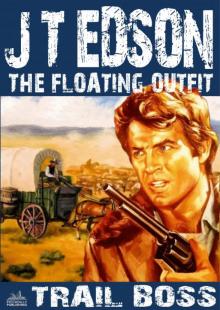 The Floating Outfit 10
The Floating Outfit 10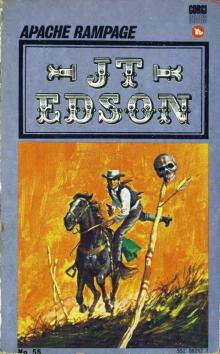 Apache Rampage
Apache Rampage The Floating Outfit 15
The Floating Outfit 15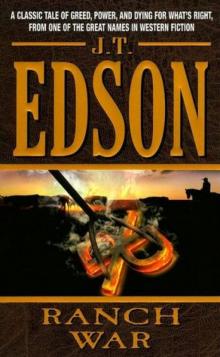 Ranch War
Ranch War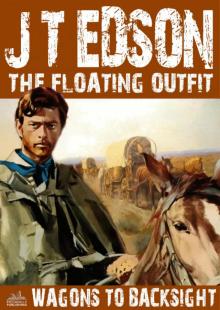 The Floating Outfit 11
The Floating Outfit 11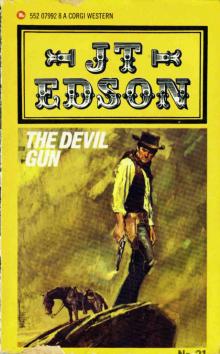 The Devil Gun
The Devil Gun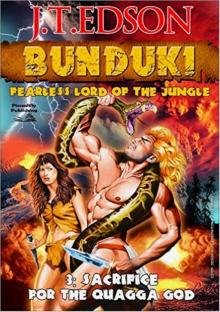 Sacrifice for the Quagga God (A Bunduki Jungle Adventure Book 3)
Sacrifice for the Quagga God (A Bunduki Jungle Adventure Book 3)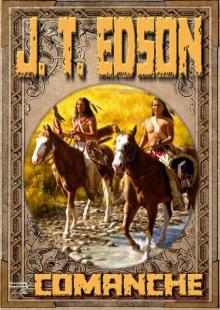 Comanche (A J.T. Edson Western Book 1)
Comanche (A J.T. Edson Western Book 1)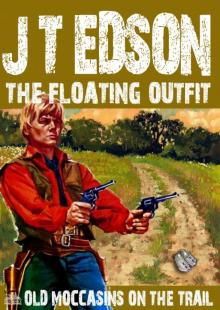 The Floating Outfit 48
The Floating Outfit 48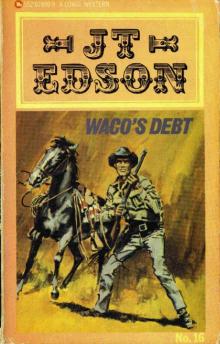 Wacos Debt
Wacos Debt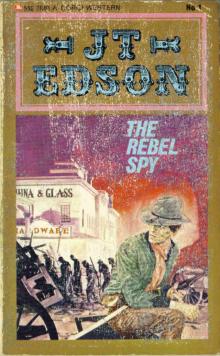 The Rebel Spy
The Rebel Spy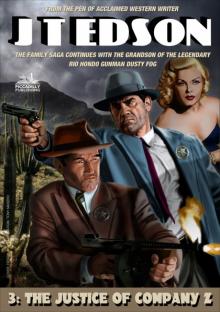 Cap Fog 3
Cap Fog 3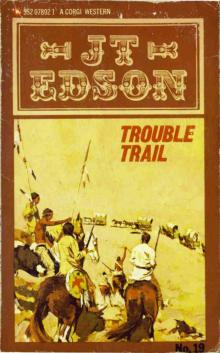 Trouble Trail
Trouble Trail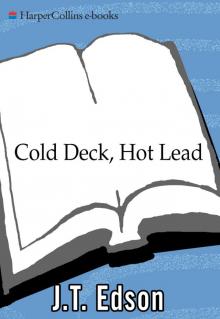 Cold Deck, Hot Lead
Cold Deck, Hot Lead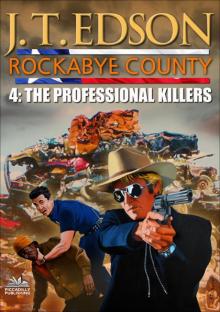 Rockabye County 4
Rockabye County 4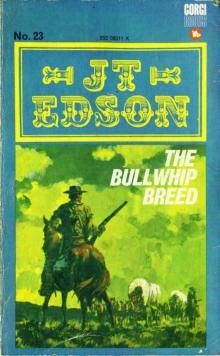 The Bullwhip Breed
The Bullwhip Breed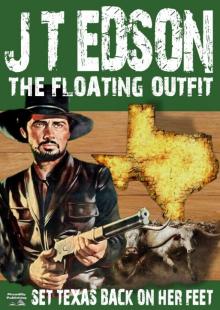 Set Texas Back On Her Feet (A Floating Outfit Western Book 6)
Set Texas Back On Her Feet (A Floating Outfit Western Book 6)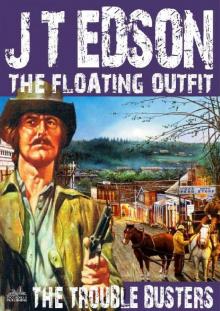 The Floating Outfit 25: The Trouble Busters (A Floating Outfit Western)
The Floating Outfit 25: The Trouble Busters (A Floating Outfit Western)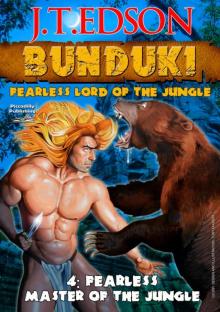 Fearless Master of the Jungle (A Bunduki Jungle Adventure
Fearless Master of the Jungle (A Bunduki Jungle Adventure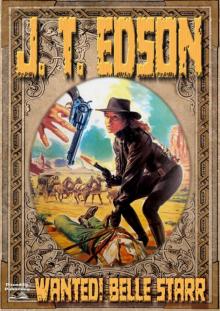 Wanted! Belle Starr!
Wanted! Belle Starr!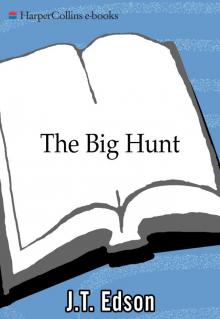 The Big Hunt
The Big Hunt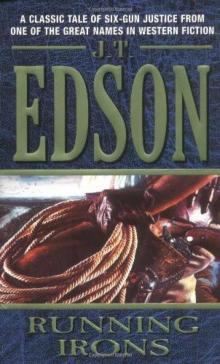 Running Irons
Running Irons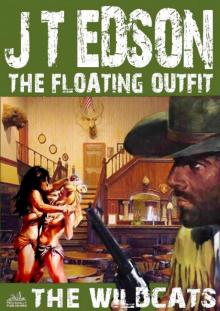 The Floating Outfit 19
The Floating Outfit 19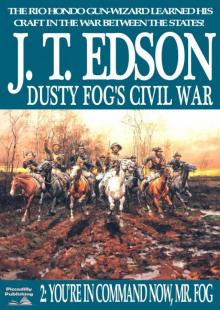 You're in Command Now, Mr Fog
You're in Command Now, Mr Fog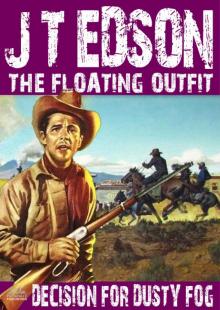 The Floating Outfit 27
The Floating Outfit 27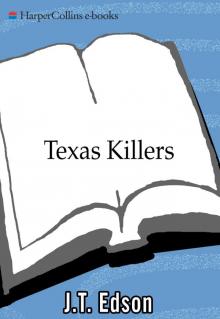 Texas Killers
Texas Killers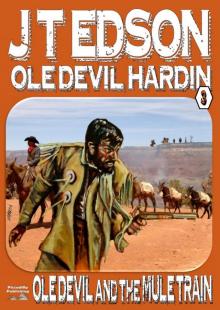 Ole Devil and the Mule Train (An Ole Devil Western Book 3)
Ole Devil and the Mule Train (An Ole Devil Western Book 3)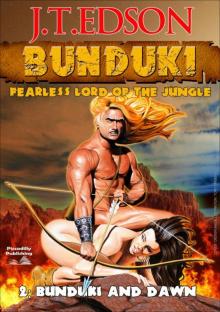 Bunduki and Dawn (A Bunduki Jungle Adventure Book 2)
Bunduki and Dawn (A Bunduki Jungle Adventure Book 2)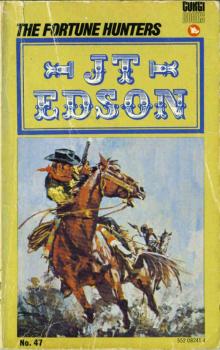 The Fortune Hunters
The Fortune Hunters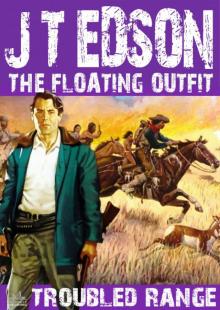 The Floating Outfit 12
The Floating Outfit 12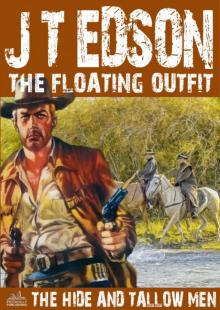 The Hide and Tallow Men (A Floating Outfit Western. Book 7)
The Hide and Tallow Men (A Floating Outfit Western. Book 7)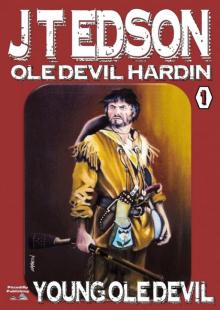 Young Ole Devil
Young Ole Devil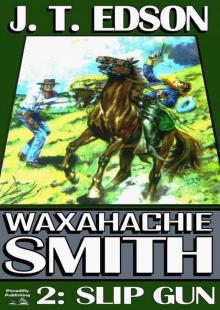 Slip Gun
Slip Gun The Drifter
The Drifter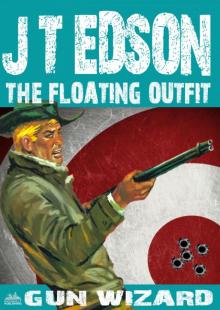 The Floating Outfit 45
The Floating Outfit 45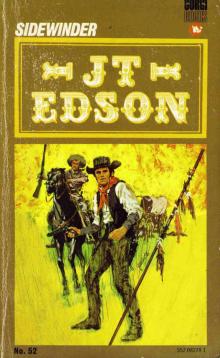 Sidewinder
Sidewinder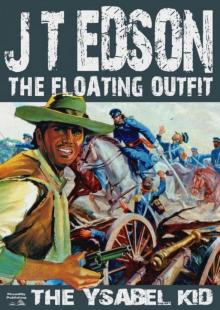 The Ysabel Kid
The Ysabel Kid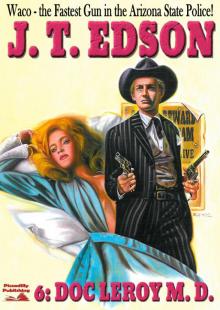 Waco 6
Waco 6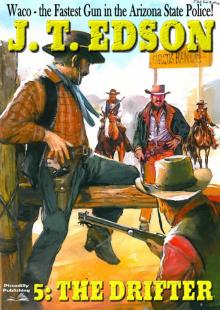 Waco 5
Waco 5 Point of Contact
Point of Contact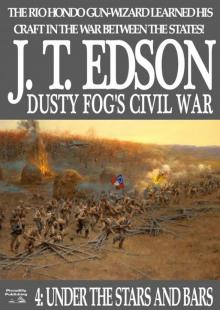 Under the Stars and Bars (A Dusty Fog Civil War Western Book 4)
Under the Stars and Bars (A Dusty Fog Civil War Western Book 4)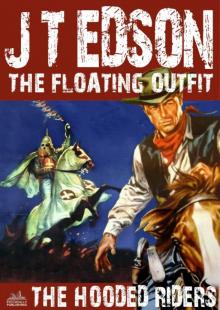 The Floating Outfit 9
The Floating Outfit 9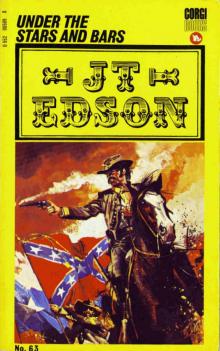 Under the Stars and Bars
Under the Stars and Bars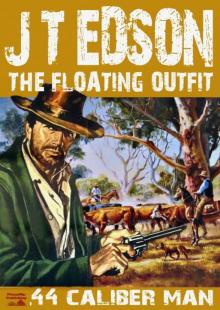 .44 Caliber Man
.44 Caliber Man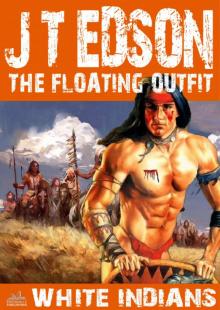 The Floating Outfit 17
The Floating Outfit 17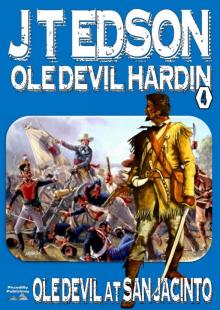 Ole Devil at San Jacinto (Old Devil Hardin Western Book 4)
Ole Devil at San Jacinto (Old Devil Hardin Western Book 4)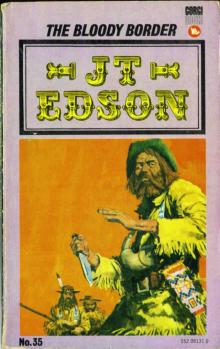 The Bloody Border
The Bloody Border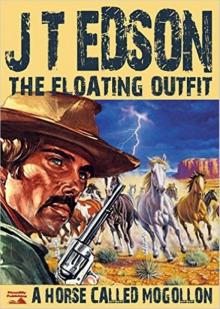 A Horse Called Mogollon (Floating Outfit Book 3)
A Horse Called Mogollon (Floating Outfit Book 3)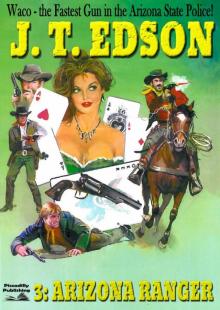 Waco 3
Waco 3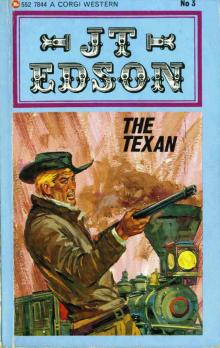 The Texan
The Texan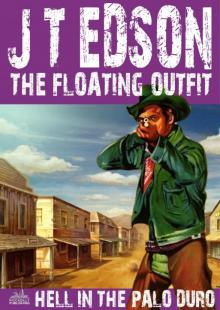 The Floating Outfit 35
The Floating Outfit 35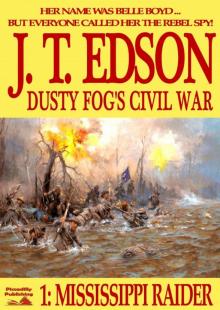 Mississippi Raider
Mississippi Raider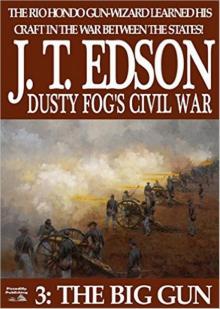 The Big Gun (Dusty Fog's Civil War Book 3)
The Big Gun (Dusty Fog's Civil War Book 3)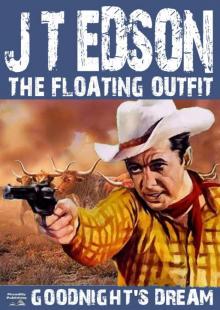 Goodnight's Dream (A Floating Outfit Western Book 4)
Goodnight's Dream (A Floating Outfit Western Book 4) Waco 4
Waco 4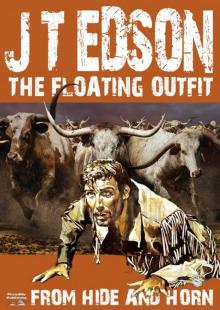 From Hide and Horn (A Floating Outfit Book Number 5)
From Hide and Horn (A Floating Outfit Book Number 5)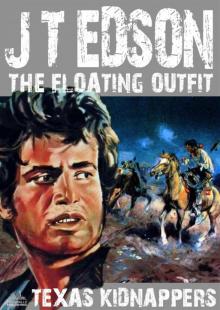 The Floating Outfit 18
The Floating Outfit 18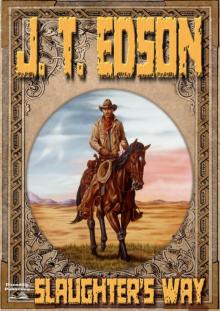 Slaughter's Way (A J.T. Edson Western)
Slaughter's Way (A J.T. Edson Western)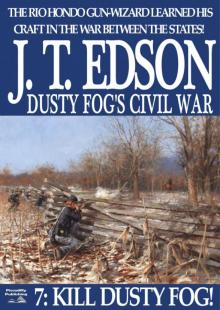 Dusty Fog's Civil War 7
Dusty Fog's Civil War 7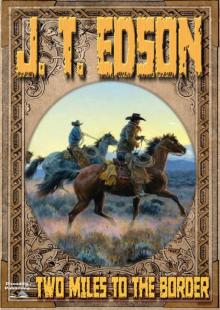 Two Miles to the Border (A J.T. Edson Western)
Two Miles to the Border (A J.T. Edson Western)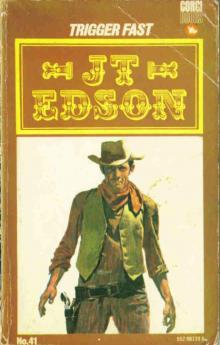 Trigger Fast
Trigger Fast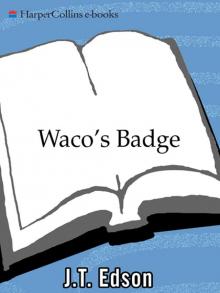 Waco's Badge
Waco's Badge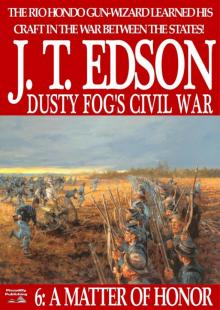 A Matter of Honor (Dusty Fog Civil War Book 6)
A Matter of Honor (Dusty Fog Civil War Book 6)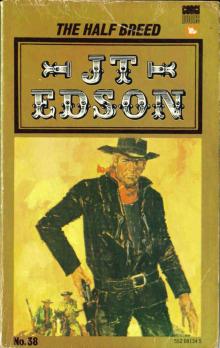 The Half Breed
The Half Breed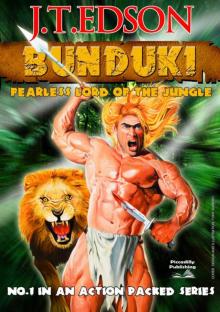 Bunduki (Bunduki Series Book One)
Bunduki (Bunduki Series Book One)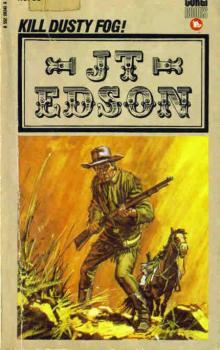 Kill Dusty Fog
Kill Dusty Fog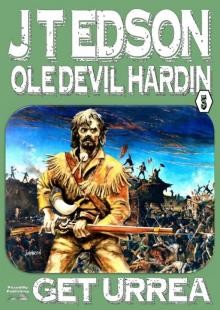 Get Urrea! (An Ole Devil Hardin Western Book 5)
Get Urrea! (An Ole Devil Hardin Western Book 5)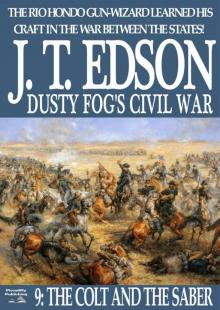 Dusty Fog's Civil War 9
Dusty Fog's Civil War 9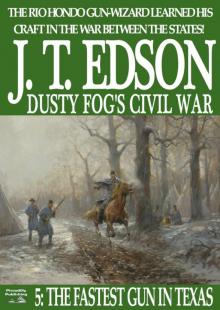 The Fastest Gun in Texas (A Dusty Fog Civil War Book 5)
The Fastest Gun in Texas (A Dusty Fog Civil War Book 5)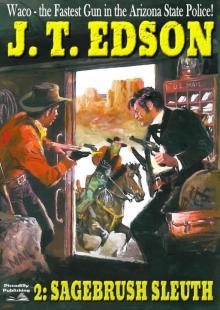 Sagebrush Sleuth (A Waco Western #2)
Sagebrush Sleuth (A Waco Western #2)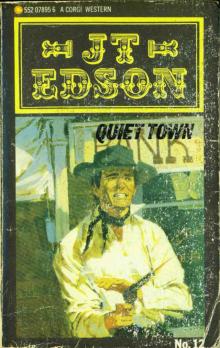 Quiet Town
Quiet Town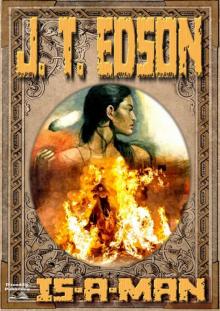 Is-A-Man (A J.T. Edson Standalone Western)
Is-A-Man (A J.T. Edson Standalone Western)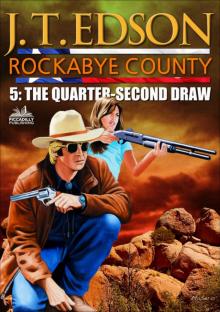 Rockabye County 5
Rockabye County 5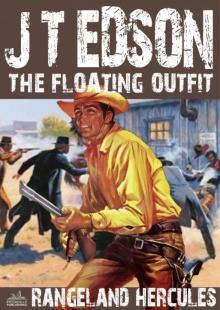 The Floating Outfit 14
The Floating Outfit 14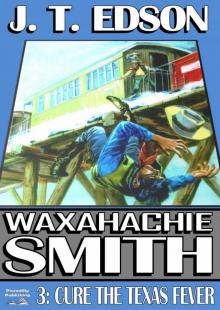 Cure the Texas Fever (A Waxahachie Smith Western--Book 3)
Cure the Texas Fever (A Waxahachie Smith Western--Book 3)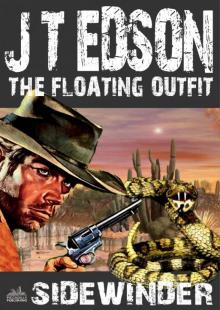 The Floating Outfit 13
The Floating Outfit 13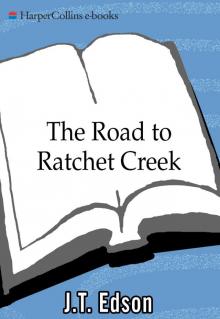 The Road to Ratchet Creek
The Road to Ratchet Creek